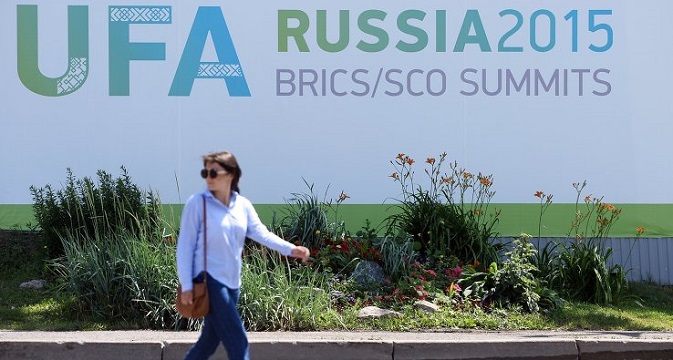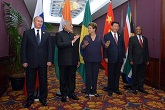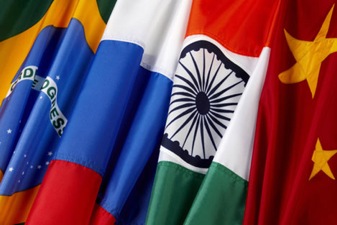Ufa twin summits: India looks to expand multilateral cooperation with Russia

Ufa, the capital city of Bashkortostan, readies to welcome SCO and BRICS summit participants. Source: BRICS2015.ru
India looks to increase its economic and strategic multilateral cooperation with Russia at the BRICS and Shanghai Cooperation Organization summits that will be held this week in the city of Ufa.
The Indian delegation led by NarendraModi, who is visiting Russia for the first time in his capacity as prime minister, will also include finance minister ArunJaitley, who will attend the inaugural meeting of the New Development Bank and the BRICS finance ministers.
Although an economic vision document will be revealed at the summit, unlike last year’s edition in Fortaleza, Brazil when the countries agreed to the formation of the developmental bank and a currency reserve pool, no big-ticket deals are likely to be announced in Ufa.
The document will most likely focus on strengthening the bank and the currency pool and the overall economic integration within the grouping. “These mechanisms are focused on stabilizing domestic capital markets in the event of crisis in the global economy and expanding opportunities for trade and investment between the BRICS countries,” says Alexander Yakovenko, Russia’s ambassador to the UK. “This strategy is very much in line with the lessons learnt from the global crisis and the crisis in the Eurozone. We hope this could serve as a major contribution to the modernization and democratization of the current international financial system.”
The New Development Bank was actually the brainchild of former Indian Prime Minister Manmohan Singh. The BRICS members could not come to agreement on its formation at the 2012 summit in Durban. It took a tremendous amount of negotiations before common ground was reached in Brazil last year, with India unhappy about not hosting the bank’s headquarters, which will be in Shanghai.
A step that will likely be discussed at the inaugural meeting of the bank, initially headed by former ICICI Bank Chairman K.V. Kamath, is credit facilities in national currencies.
India, which is also the second largest shareholder in the China-led Asian Infrastructure Investment Bank or AIIB, is keen to see that the BRICS Bank becomes a success, as it is increasingly frustrated with punching below its economic weight in the West-dominated Bretton Woods Institutions.
There have been absolutely no leaks on the content of the economic vision document. It remains to be seen, what the next steps can be to integrate the diverse economies of Brazil, Russia, India, China and South Africa.Russia, which faced a currency crisis at the end of last year, is one of the key proponents of bypassing hard currencies and introducing trade settlements in national currencies. It has already taken the initiative with China and set up a mechanism to explore the option with India. Brazil and South Africa have showed a lesser degree of enthusiasm for such a move.
SCO membership expansion
The Shanghai Cooperation Organization (SCO) is expected to accept India and Pakistan as permanent members at the Ufa summit.The security grouping, which was formed in 2001, has six permanent members: China, Kazakhstan, Kyrgyzstan, Russia, Tajikistan, and Uzbekistan.
Pakistan, which along with India, Iran Afghanistan and Mongolia, is an observer at the SCO, has been asking for permanent membership since 2006. India, at that time was seeking closer ties with the West and was hesitant to become a member of a security group that looked to be antagonistic towards the United States.
It was only towards the beginning of this decade that New Delhi moved towards seeking full membership in the grouping. Reports in the India media in June indicated that NarendraModi hinted at not attending the SCO summit in Ufa, if India was not accepted as a full member. Although no official statement has been made on SCO expansion, the addition of India and Pakistan into the grouping looks like a foregone conclusion.
Both China and Russia, the real leaders of the SCO, have gone on the record to state that they fully endorse the expansion of the grouping to include India and Pakistan. In an article that was published on the website of China’s state-run television channel, GuJianjun wrote that theinclusion of the South Asian neighbors into the SCO “would be conducive to the implementation” of Xi Jinping’s to pet projects: the Silk Road Economic Belt and the 21st century Maritime Silk Road.
Russian and Chinese analysts are also of the opinion that membership in the SCO would help India and Pakistan reduce bilateral tensions and improve ties. Having the two countries on board the SCO also helps further the Russian international strategy of a multi-polar world.
While India, which continues to have excellent bilateral relations with Russia, is also eager to expand multilateral cooperation via BRICS, SCO and a comprehensive economic partnership agreement with the Eurasian Economic Union, one of the pillars of Narendra Modi’s foreign policy is to ensure that India’s ties with the West continue to grow. New Delhi will likely play a delicate balancing act over the next few years, as it tries to keep all its partners happy.
All rights reserved by Rossiyskaya Gazeta.
Subscribe
to our newsletter!
Get the week's best stories straight to your inbox

